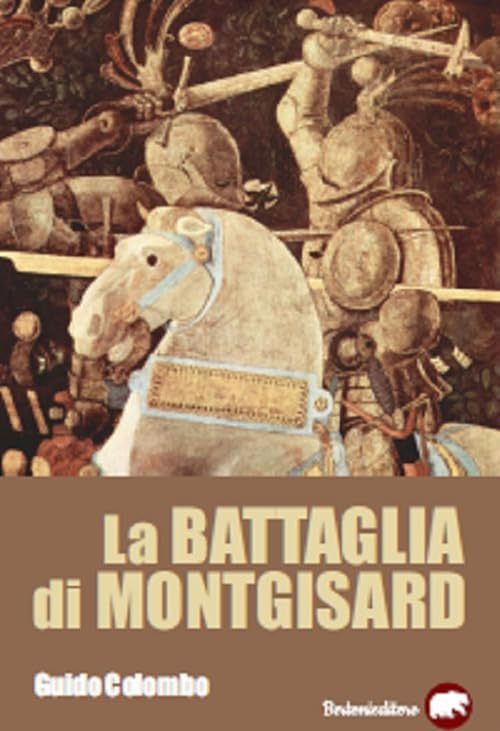#montgisard
Note
Your thoughts on The Battle of Montgisard?
Definitely one of those "once in a century" type events, imo.
There's quite a few YouTube video analyses/documentaries (and even attempts at various video game recreations) of the battle, so I won't repeat what you can easily find elsewhere.
But, suffice it to say, I think it was the combination of just the right factors that led to Baldwin's seemingly-impossible victory. These included (but are not limited to) the young king's own leadership skills, those of his commanders, Saladin's lack of preparation... and just plain old luck.😆
There's a quote from a user manual of an old RPG I used to play that says "Overconfidence can be an epitaph". This was very nearly proven true at Montgisard. Saladin's overconfidence, I think, was probably the biggest contributor to Baldwin's win. He thought he had Baldwin hemmed in at Ascalon, didn't think that the king would break past the force he left behind (or, at the very least, not that quickly), and let his army spread out too much. That plus the environmental conditions with the mired baggage train, and it became a recipe for disaster for Saladin - and a prime opportunity for Baldwin.
If you want a good laugh, there is an absolutely hilarious discussion of it here. BUT be warned that it is the kind of humor that is riddled with foul language, so if that's not your thing, beware. XD
#ask#reply#zomnommbie#battle of montgisard#king baldwin iv#baldwin iv#saladin#montgisard#the leper king#baldwin iv of jerusalem#crusades#kingdom of heaven#kingdom of heaven 2005#history#historical event
43 notes
·
View notes
Photo

Em 1177, o Reino de Jerusalém enfrentou duas grandes crises, uma interna e outra externa. Internamente, a questão envolvia quem sucederia o rei Balduíno IV, de dezesseis anos, que, como leproso, não produziria herdeiros. O candidato mais provável era o filho de sua irmã viúva e grávida, Sibila. Enquanto os nobres do reino procuravam um novo marido para Sibila, a situação se complicou com a chegada de Filipe da Alsácia que exigiu que ela se casasse com um de seus vassalos. Fugindo do pedido de Filipe, Balduíno procurou formar uma aliança com o Império Bizantino com o objetivo de atacar o Egito. Enquanto Balduíno e Filipe tramavam sobre o Egito, o líder dos aiúbidas, Saladino, começou a se preparar para atacar Jerusalém de sua base no Egito. Movendo-se com 27.000 homens, Saladino marchou para a Palestina. Embora não tivesse os números de Saladino, Balduíno mobilizou suas forças com o objetivo de montar uma defesa em Ascalon. Como ele era jovem e enfraquecido por sua doença, Balduíno deu o comando efetivo de suas forças a Reinaldo de Chatillon. Marchando com 375 cavaleiros, 80 Templários sob o comando de Odo de St. Amand e vários milhares de infantaria, Balduíno chegou à cidade e foi rapidamente bloqueado por um destacamento do exército de Saladino. Confiante de que Balduíno, com sua força menor, não tentaria interferir, Saladino moveu-se lentamente e saqueou as aldeias de Ramla, Lydda e Arsuf. Ao fazer isso, ele permitiu que seu exército se dispersasse por uma grande área. Em Ascalon, Balduíno e Reinaldo conseguiram escapar movendo-se ao longo da costa e marcharam sobre Saladino com o objetivo de interceptá-lo antes que ele chegasse a Jerusalém. Em 25 de novembro, eles encontraram Saladino em Montgisard, perto de Ramla. Pego de total surpresa, Saladino correu para reconcentrar seu exército para a batalha. Continua nos comentários _______ 📸A Batalha de Montgisard, 1177, por Charles Philippe Larivière _______ Fonte - Jean Richard: The Latin kingdom of Jerusalem. #Curitiba #idademedia #medieval #historia #cwb #history #MiddleAges #medievalworld #medievaltimes #montgisard #jerusalem #deusvult #historiamedieval https://www.instagram.com/p/ClYccxeuX6_/?igshid=NGJjMDIxMWI=
#curitiba#idademedia#medieval#historia#cwb#history#middleages#medievalworld#medievaltimes#montgisard#jerusalem#deusvult#historiamedieval
0 notes
Text

King Baldwin IV 🗡🏰 845 years ago, 25 november 1177, was a Battle of Montgisard 🛡the 16 years old King greatest victory ⚔️⚔️
#Iwo Aranel#IwoAranel#Baldwin IV#King Baldwin IV#Balduino IV#Kingdom of Heaven#Baldwin#portrait#art#Jerusalem#Iwo Mountain Cat#Pencil#Battle of Montgisard
142 notes
·
View notes
Text
So here's one of the coolest things that has happened to me as a Tolkien nut and an amateur medievalist. It's also impacted my view of the way Tolkien writes women.
Here's Carl Stephenson in MEDIEVAL FEUDALISM, explaining the roots of the ceremony of knighthood:
"In the second century after Christ the Roman historian Tacitus wrote an essay which he called Germania, and which has remained justly famous. He declares that the Germans, though divided into numerous tribes, constitute a single people characterised by common traits and a common mode of life. The typical German is a warrior. [...] Except when armed, they perform no business, either private or public. But it is not their custom that any one should assume arms without the formal approval of the tribe. Before the assembly the youth receives a shield and spear from his father, some other relative, or one of the chief men, and this gift corresponds to the toga virilis among the Romans--making him a citizen rather than a member of a household" (pp 2-3).
Got it?
Remember how Tolkien was a medievalist who based his Rohirrim on Anglo-Saxon England, which came from those Germanic tribes Tacitus was talking about?
Stephenson argues that the customs described by Tacitus continued into the early middle ages eventually giving rise to the medieval feudal system. One of these customs was the gift of arms, which transformed into the ceremony of knighthood:
"Tacitus, it will be remembered, describes the ancient German custom by which a youth was presented with a shield and a spear to mark his attainment of man's estate. What seems to the be same ceremony reappears under the Carolingians. In 791, we are told, Charlemagne caused Prince Louis to be girded with a sword in celebration of his adolescence; and forty-seven years later Louis in turn decorated his fifteen-year-old son Charles "with the arms of manhood, i.e., a sword." Here, obviously, we may see the origin of the later adoubement, which long remained a formal investiture with arms, or with some one of them as a symbol. Thus the Bayeux Tapestry represents the knighting of Earl Harold by William of Normandy under the legend: Hic Willelmus dedit Haroldo arma (Here William gave arms to Harold). [...] Scores of other examples are to be found in the French chronicles and chansons de geste, which, despite much variation of detail, agree on the essentials. And whatever the derivation of the words, the English expression "dubbing to knighthood" must have been closely related to the French adoubement" (pp 47-48.)
In its simplest form, according to Stephenson, the ceremony of knighthood included "at most the presentation of a sword, a few words of admonition, and the accolade."
OK. So what does this have to do with Tolkien and his women? AHAHAHAHA I AM SO GLAD YOU ASKED. First of all, let's agree that Tolkien, a medievalist, undoubtedly was aware of all the above. Second, turn with me in your copy of The Lord of the Rings to chapter 6 of The Two Towers, "The King of the Golden Hall", when Theoden and his councillors agree that Eowyn should lead the people while the men are away at war. (This, of course, was something that medieval noblewomen regularly did: one small example is an 1178 letter from a Hospitaller knight serving in the Latin kingdom of Jerusalem which records that before marching out to the battle of Montgisard, "We put the defence of the Tower of David and the whole city in the hands of our women".) But in The Lord of the Rings, there's a little ceremony.
"'Let her be as lord to the Eorlingas, while we are gone.'
'It shall be so,' said Theoden. 'Let the heralds announce to the folk that the Lady Eowyn will lead them!'
Then the king sat upon a seat before his doors and Eowyn knelt before him and received from him a sword and a fair corselet."
I YELLED when I realised what I was reading right there. You see, the king doesn't just have the heralds announce that Eowyn is in charge. He gives her weapons.
Theoden makes Eowyn a knight of the Riddermark.
Not only that, but I think this is a huge deal for several reasons. That is, Tolkien knew what he was doing here.
From my reading in medieval history, I'm aware of women choosing to fight and bear arms, as well as becoming military leaders while the men are away at some war or as prisoners. What I haven't seen is women actually receiving knighthood. Anyone could fight as a knight if they could afford the (very pricy) horse and armour, and anyone could lead a nation as long as they were accepted by the leaders. But you just don't see women getting knighted like this.
Tolkien therefore chose to write a medieval-coded society, Rohan, where women arguably had greater equality with men than they did in actual medieval societies.
I think that should tell us something about who Tolkien was as a person and how he viewed women - perhaps he didn't write them with equal parity to men (there are undeniably more prominent male characters in The Lord of the Rings and The Hobbit, at least, than female) but compared to the medieval societies that were his life's work, and arguably even compared to the society he lived in, he was remarkably egalitarian.
I think it should also tell us something about the craft of writing fantasy.
No, you don't have to include gut wrenching misogyny and violence against women in order to write "realistic" medieval-inspired fantasy.
Tolkien's fantasy worlds are DEEPLY informed by medieval history to an extent most laypeople will never fully appreciate. The attitudes, the language, the ABSOLUTELY FLAWLESS use of medieval military tactics...heck, even just the way that people travel long distances on foot...all of it is brilliantly medieval.
The fact that Theoden bestows arms on Eowyn is just one tiny detail that is deeply rooted in medieval history. Even though he's giving those arms to a woman in a fantasy land full of elves and hobbits and wizards, it's still a wonderfully historically accurate detail.
Of course, I've ranted before about how misogyny and sexism wasn't actually as bad in medieval times as a lot of people today think. But from the way SOME fantasy authors talk, you'd think that historical accuracy will disappear in a puff of smoke if every woman in the dragon-infested fantasy land isn't being traumatised on the regular.
Tolkien did better. Be like Tolkien.
#tolkien#middle earth#jrr tolkien#lord of the rings#lotr#the lord of the rings#eowyn#writing fantasy#fantasy#female characters#writing#historical fiction#medieval women#medieval history#medieval#history#womens history
8K notes
·
View notes
Text
Masterlist
Fluff
King Baldwin IV reaction to drunk reader
King Baldwin IV reaction to reader being injured by her brother in law
Waking up early morning with Baldwin
Baldwin and Salah ad Din's daughter
Baldwin teaching his son chess and reader admiring them slight angst
Reader being married to Baldwin since childhood sharing kiss after Battle of Montgisard
Reader being blackmailed to leave Baldwin
Baldwin celebrating Christmas with reader and his in-laws in modern world
Jealous Baldwin reaction to reader wearing bikini
Baldwin comforting wife!reader after difficult birth
King Baldwin IV x Reader : Tantalizing Love slight angst
Reader teaches Baldwin to cook whilst she is pregnant
Baldwin taking care of pregnant wife reader
King Baldwin IV proposes female reader
Headcanon
Being queen consort of Jerusalem
King Baldwin IV as lover, husband and father
King Baldwin IV being angry at reader
Angst
King Baldwin IV being unfaithful to reader Alternate ending 1 Alternate ending 2
King Baldwin IV has to annul his marriage with reader
Lost Cause
Baldwin choosing between woman and he loves and woman he has to marry
Baldwin reaction to wife!reader trying to cure him
Smut
King Baldwin IV x Reader: Throne Sex
King Baldwin IV x Reader : Misogyny Sex
King Baldwin IV x Reader : Period Sex
King Baldwin IV x Reader: Erotic Night
King Baldwin IV seducing shy physician reader
King Baldwin IV spending honeymoon night with reader
Reader asking Baldwin help for her lactating breasts
Baldwin and chubby wife!reader trying annal sex
Baldwin and Salahuddin
King Baldwin IV x Reader x Saladin Part 1 Part 2 smut
Widowed reader marries Salahuddin angst
Salahuddin
Reader spoils him and loves being near him
Horror
Spectral Descent
History
A letter from King Baldwin IV and Princess Sibylla of Jerusalem Source: https://epistolae.ctl.columbia.edu/letter/25233.html
King Baldwin IV of Jerusalem appearance-STUDY by MariaExe on DeviantArt.com Artist- MariaExe on DeviantArt
King Baldwin IV appearance based on historical painting Part 1 Part 2
A letter From King Baldwin IV of Jerusalem to King Louis VII of France Source: Bernhard Hamilton -The Leper King and his heirs
LETTER FROM KING BALDWIN IV TO THE ENVOYS WITH NEWS OF SALADIN RAVAGES NABLUS, SEBASTE, AND OTHER TOWNS
Source:https://goodshksk.space/product_details/13546547.html
A Letter of Condolence to King Baldwin IV from Saladin Source: https://advocatetanmoy.com/2023/10/14/saladins-condolence-letter-to-king-baldwin-iv-of-jerusalem/
Seal of King Baldwin IV of Jerusalem Source:https://numismatics.org/collection/1956.152.1
Medieval Heroes: Baldwin IV
Miscellaneous
Would Baldwin be attracted to chubby and short person
Would Baldwin be unfaithful historically
Salahuddin: The conqueror of Jerusalem series King Baldwin IV
Would Baldwin be obsessive or possessive
Would Baldwin be impotent and would he be able to have sexual relationship
Can Baldwin be able to have sexual relationship: Revised Version
Blurbs
NSFW thoughts
#kingdom of heaven#kingdom of heaven 2005#kingdom of heaven fandom#kingdom of heaven fanfic#kingdom of heaven fanfiction#kingdom of heaven headcanons#baldwin iv#baldwin iv imagine#baldwin iv x reader#king baldwin iv
136 notes
·
View notes
Text
You are the one I’d come looking for. Over and over and over again

A/N: I am SO sorry for this but I can’t believe I’ve never seen a fanfic like this so I took it upon myself to write it. No beta reading or editing. We die like..nevermind
TW: angst, hurt and comfort, leprosy? No one is dying!!
People had thought her foolish for longer than she could think.
A pretty, young maiden from a good house, wealthy parents with political influence others could only dream of and yet she had chosen to marry a leper.
The king of Jerusalem was well known around nobility for more than just that of course, having won the battle of Montgisard against the Arabs at such young age seemed like a miracle from God above.
Even before that she had been by his side and it was not the fortunes, glory or status that had interested her which would no doubt be beneficial side effects of being married to him.
No young woman in her right mind would have willingly accepted the hand of a man doomed and she could hardly blame them.
Her parents had approved of the marriage as their hands were bound, depending on trade offers and the generosity of the holy land for their own existence.
Even then, when the letter from the court of Jerusalem had arrived they had been worried about the future of their darling girl.
Everyone had been, even nobility from far away and the news of King Baldwins marriage had spread quickly and then the whispering began.
She had never been bothered by the likes of them, faithful to her new husband who treated her with utmost care, she had everything she could have ever asked for and more.
He was a good man, gentle and wise for his age and he was grateful she had accepted his hand in marriage, he would have been a fool to not treat her well.
To him it was more than a political match propagating his strength to the outside kingdoms and his own.
To him this young woman was home, acceptance and love.
Despite all this their marriage was a slightly unusual one.
They had never been able to kiss nor were they able to consummate the marriage in a way deemed proper, the king refusing to risk contagion and his physicians agreed with him.
Despite all this she had never minded the lack of physicality in their marriage all that much.
She cared about him in a way that was beyond desires of the flesh, what they shared came close to holiness.
They talked a lot, shared poems and stories when she would caress his bandaged hands.
She would spend the late evenings in their shared chambers, after a tremendous amount of convincing, finally applying ointments to his sore, blistered skin to help it slow the spreading.
She would caress his bare back with fingers gentle as if she feared he would disappear into thin air, like a vision or a daydream, is she dared touching him too firmly.
In their eyes those sacred moments were almost enough but of course even the fate of the most pure could be harsh more often than not.
It started with a pale rash on her side, right over her ribs.
At first she had been sure it had come from spending too much time in the stables, perhaps she had been bitten by an insect.
Then one night when she had just finished brushing her hair before going to bed she noticed the tingling numbness in her fingers and feet.
It started slowly, like tiny ants crawling over her skin, not painful but the recognition was and she could feel her heart drop.
Though it wasn’t herself she feared for.
Baldwin let his best physicians be called to their shared chambers immediately.
After the three men had taken a look at her, whispering in a foreign language with their eyes drooped with worry and told them how deeply sorry they were the young king wished for his instant death.
He had always had a hard time being kind to himself, never to others but the wave of agony that rolled over him threatened to swallow him whole, burning like a demonic fury.
Her own eyes brimmed with tears and she sat up after the physicians had left, so frightened for her husband who was now sitting on the edge of the bed, his masked face buried in his hands with his shoulders trembling.
There was no use denying that she had caught the disease.
It was only a matter of time, she is playing with fire, others had whispered behind her back when they thought she wasn’t listening.
“Baldwin..” crawling up on the bed right behind him she wrapped her arms around his shoulders.
The gesture that had comforted him even in his worst moments now seemed to shatter his heart even more so.
“I have been so foolish..my beautiful, beautiful angel” he whispered, his voice dying in his throat and when he raised his head his eyes were flooded with tears.
He was trembling as he spoke and she was frightened as he nearly seemed mad with grief.
“You should have never come here..I should have never asked anyone, you, to put themselves in danger for my foolishness. If the Lord wants to punish me so be it but why would he wish to punish you of all people? When it was I who was selfish?”
She only noticed that she too was crying when she tasted the salt on her lips, wiping it with shaking fingers.
“Do not say such things..you are not selfish, nor foolish. It was I who made the decision to accept the offer to marry you with the pain and dangers that I was warned of. And I swear to you that even now I do not regret our vows, a single day or night we spent together”
Reaching out for him he cupped his cheek, a pained smile gracing her features in the soft candle light of his chambers.
“Please do not blame yourself my love. I am not scared of my fate but I am scared of losing you, whether it be to grief or shame. I beg of you, don’t leave me now”
There had never been a moment where Baldwin had to fight against contempt for himself as in this very moment.
He disdained himself for causing her to share his fate when he should have been the one to be level headed, keeping a distance for her own safety when in reality he was the one searching for her warmth like a frightened little boy.
Now there was no use avoiding her, he recognised with bitterness seeping like pus from an open wound.
Now it was too late, the die had been cast but all words of comfort, an apology he could have offered her seemed to be worthless now and he knew this sweet, innocent girl would not hear it.
How wonderfully stubborn she could be sometimes, with too much love to give and headstrong to a point where it was almost unbecoming for a woman but he wouldn’t have it any differently.
“Come now” she murmured, shuffling on the bed to slip underneath the covers.
The silken sheets were cool against her skin and a part of her wondered for how long she would be able to feel them at all.
She pulled him in as she did every night since they had exchanged their vows, his head resting against her shoulder and she caressed his soft hair soothingly.
“The promise of God is not that He will never give us more weight than we want to carry. The promise of God is that He will never put more on us than we can bear.”
Her voice was so soft as she spoke, without a tremor and she was not scared anymore.
Not for herself nor for him, not when God was watching over them, not when her love for him burned stronger than ever and she could feel his heart beating, so alive and warm in his chest.
“Let us not waste the precious time we have..not a second”
This was something the young king could not disagree with and how eager he was for her comfort if that meant to comfort her.
Now he had to be strong for her sake when she needed him now more than ever before, and she was right.
The promise of God is that He will never put more on us than we can bear, no matter how heavy the burden can be in the darkest times.
He shuddered when he felt her gentle fingers sliding the silver mask off his face as she had done many times before but something about it now felt different.
His eyes were wide, still glossy and red, his face scarred severely but she could only see the man she loved more than anyone or anything.
They looked at each other for what felt like hours, the fingers of one hand entwined, the other on each others cheek, stroking over skin, gently brushing a strand of hair behind one’s ear.
She was the one to lean in first and to him the feeling of her soft lips on his, for the first time ever felt like he was being reborn.
The kiss was clumsy with inexperience but it could not have been more raw and honest.
She kissed him like she didn’t care about his disfigured lips and he kissed her like it was the last thing he would ever do.
Both of them kissed like they had been starving for this and now there was nothing left to lose and by the end of the kiss both of them were crying.
A soft sob rose in his chest, fading into a huffed out laugh and he seemed drunk with fondness for her.
She only smiled, wiping his tears as he wiped hers before leaning in again to kiss her warm, soft lips once more with more urgency this time, in disbelief that he would get to experience something like this after all.
Something that made him feel less alone, more like any normal young man instead.
A wave of warmth flooded him when he felt a small, soft hand slip underneath his nightgown, resting on his bare stomach and when he pulled away from the kiss, his cheeks flushed he recognised the desire in her eyes.
Honest and playful as she was and despite his nervously racing heart he gave her the most timid nod.
There was no fear within either of them now, uncertainty perhaps and pain surely, worry about what the future might bring but they had each other after all.
Each other and a life time left to love, however long that might be.
#baldwin iv#king baldwin iv#kingdom of heaven#baldwin iv x reader#baldwin iv headcanons#baldwin iv fanfiction
94 notes
·
View notes
Text

Because Chapter 12 of Aere Perennius is out...
This is a redraw of that one scene from the 1968 Romeo and Juliet film except posed to be more...them. Also just the urge to make her hair fluffier every time I draw her.
I gag myself when I draw scenes like this when Baldwin and Luceria are literally struggling to even say each other's names. (The fic starts out with them both being 14/15...and he hasn't even won Montgisard yet 💀💀)
#baldwin iv#kingdom of heaven#king baldwin iv#koh#fanart#leper king#art#artists on tumblr#artwork#my art#aere perennius#baldwin iv x original character
66 notes
·
View notes
Text
Baldwin IV. (1161 - 1185) was the king of Jerusalem (1174-85), called the "leper king" for the disease that afflicted him for most of his short life. His reign saw the growth of factionalism among the Latin nobility that weakened the kingdom during the years when its greatest adversary, the Muslim leader Saladin, extended his influence from Egypt to Syria.
Leprosy had made the young ruler the "half-dead king" of Jerusalem.
The young, leprous king was able to repel Saladin's invasion of the kingdom from Egypt in 1177 at the Battle of Montgisard, despite being significantly outnumbered.
"He mustered all his courage and went into battle against Saladin." The great historian William of Tyre, who had been the king's tutor, wrote in justification: "He believed that it was wiser to accept the uncertain fate of a battle against the enemy than to accept that his people would suffer robbery, fire and massacres."
#history#Crusaders#education#educate yourself#learn about history#baldwin iv#kingdom of heaven#saladin#history is important#kings#12th century#crusade#teaching#studyblr
39 notes
·
View notes
Text
QUICK MESSAGE
For all the people who sent me fic/headcanons requests, they're being written don't worry! It's taking me much, much longer than expected because of some school issues I've been having, but they're on their way to get posted!
Hopefully they'll be almost all out before june, but I won't make promises.
Just so that you know that your requests haven't been forgotten, here's a list of all requested Baldwin IV fics that I'm working on rn:
Reader sneaks into the battle of Montgisard to reunite with her husband
Reversed "sweetest of melodies" where Baldwin is the one singing
Labor and birth headcanons
Reader giving birth to triplets (will probably be a part 1 for the other following two)
Baldwin has to keep distance from his newborn children
Baldwin and reader spending time with their children
Baldwin falls in love with the bandit that kidnapped him
Baldwin comforting reader after a nightmare
General headcanons
Only case in which Baldwin would lash out at reader
Reader who loves math
Baldwin falling in love with a servant
These should be all, I really wanted to make this post to reassure those who have asked for these fics almost weeks ago, please bare with me I'm trying to write as quickly as possible without lowering the quality of my writing😭😭
#kingdom of heaven#king baldwin x reader#king baldwin iv#writers on tumblr#headcanons#fluff#my fic#f!reader#king baldwin x you#angst#requests closed#writing requests#anon request
44 notes
·
View notes
Text
Baldwin iv x mermaid reader
I've had this idea in my head for a while and ended up creating a kind of prologue to this story. Any spelling mistakes please forgive me, I used a translator to leave it in English as that is not my language.
Mermaids. Monsters who use their sweet voices to enchant and bewitch men. That's what people thought I was and that's why I was hunted all my life.
Because I was the last mermaid.
And ever since sailors discovered a way of not being affected by the sirens' singing about five years ago, the hunt for mermaids has turned into a veritable genocide.
Their sisters, in an act of desperation at seeing that many of their companions were being used as a mere pleasure to humans, having to use their precious voices to satisfy them, forced me to take a potion that would destroy my vocal cords. So that my most powerful song could no longer be used as a weapon by humans.
Today was my fifteenth birthday, but what did that matter when I was about to lose the life I had fought so hard for?
"We did it, we caught a mermaid!"
The sailors shouted and celebrated with joy as you struggled over the huge fishing net that had caught you.
"It's been five years since anyone managed to catch a mermaid"
"She must be the last of her kind"
"We're going to make a fortune from her!"
With every word the sailors said, your desperation grew. You didn't want to be captured, you didn't want to be killed to become exotic meat or a mere object for men. The only thing you wanted was freedom and the happiness of living a peaceful life, but now nothing could be done.
As soon as the boat reached the shore, you were forced to assume your human form, but your lavender hair and eyes that seemed to reflect a rainbow under the sun made it clear that you were a mermaid, causing countless disgusted looks to be directed at you.
The captain of the ship took you to the French king to sell you for an exorbitant price, but before he even arrived, it turned out that you were mute and couldn't use your songs to heal or captivate anyone. This led to you being sold for a price far below what he wanted.
"You worthless creature!"
The captain threw a glass bowl in your direction and, by reflex, you protected yourself as much as you could with your arms bound in chains.
"One of your few uses is to use your voice as pleasure for men and you can't even do that!"
Tears began to stream down your face. The reason was the humiliation she had suffered and the pain from the cuts on her arms. Luckily, it wasn't long before that horrible man sold you and left, but your troubles had only just begun.
You were locked in a cage and for weeks your routine was to make do with the little food and water you received. The king sometimes brought various people to admire you, but he soon lost interest in you.
Like a mermaid who couldn't sing, you were of little use to him, but then the king received some news.
The King of Jerusalem, Baldwin IV, had won a very important battle at Montgisard. He, a boy of only 16, led the outnumbered Christian forces against Saladin's troops and won the battle.
The King of France decided to give you as a present to this young man, so once again you were chained up in the hold of a ship, where for months your only consolation was to listen to the waves of the sea.
After the exhausting journey, you finally arrived in Jerusalem.
The drier air was hot and made you feel constantly dehydrated, and the language the people there spoke was different from what you knew.
A deep hatred took over your body, and then you met it.
"Are you all right?"
It was the first thing he asked you and even though he knew you wouldn't be able to answer, he hoped to discover your answer just by looking at you. And even when he received only a perplexed look from you, he treated you with tenderness, wrapping you in his own cloak and asking his trusted servants to look after you.
'Why does he treat me so tenderly?'
This question kept running through her mind.
And as time went by, feelings began to blossom in both of you. Small acts became actions of love and the love that existed between the two of us was so great that nothing could stop you from being together.
Not even Baldwin's leprosy, the greed of Guy de Lusignan and Reinaldo de Châtillon or Saladin's army could separate you.
'I'm going to get my voice back, cure Baldwin with the siren's song of healing and help him defeat every enemy that comes along'
That was his thought, that was his determination.
45 notes
·
View notes
Note
I have read some articles that refer to or show Balwin as somewhat sadistic, for example in one I read that he used to go on excursions and burn, rob and kill Saracen villages and he shows us as a ruthless and arrogant guy. Have you read anything about that? What do you think about it? Do you think it's false?
Admittedly, even though I have collected quite a few resources on the historical Baldwin IV over recent months, I haven't had the chance to pore over them in detail.
However, from what little I have read, I do know that, after Baldwin refused to renew Raymond III of Tripoli's truce with Saladin and decided to resume Amalric's efforts to curb Saladin's growing power, back-and-forth raiding on both sides was rather frequent. And though we would condemn such behavior today, in medieval warfare, it's par for the course. Part of the strategy behind doing such things was not only to obtain valuable (and sometimes scarce) resources, but also to damage the opposing side's economy to make their efforts more difficult. Saladin sacked and looted farms and villages on his way to Jerusalem before the Battle of Montgisard; likewise, Baldwin engaged in raids during the tug-of-war over Jacob's Ford - all of which was likely exacerbated by the problems with famine at the time. Unlike Ridley Scott's depiction in KoH, these battles and raids back and forth across the borders of the Kingdom of Jerusalem and Syria were broken only by very short truces that seem to have revolved around resource availability and temporary interests elsewhere.
Does this make Baldwin "sadistic"? By the standards of his day, no. Any other monarch of the period would have likely made the same choices with an enemy force on their doorstep and whilst in a semi-permanent state of war. Further, we don't really have any insights into Baldwin's reasoning for his decisions because we aren't privy to his personal thoughts on the matter. On top of that, what little first-hand accounts we have all possess their own biases, which was also common - those on the side who performed such raids would see them as clever/advantageous, and those on the side being raided would see them as abominable.
It is interesting to note that, during one of these later defense-testing missions at Darayya, Baldwin apparently threatened the great mosque there, but when the Christians local to the area protested for fear of retaliatory harm to their churches, he promptly abandoned the idea and left.
#akeo102d#baldwin iv#kingdom of heaven#king baldwin iv#baldwin iv of jerusalem#the leper king#history#medieval history#crusades#ask
40 notes
·
View notes
Note
Other than leper king and his heirs which book would you recommend for research on Baldwin iv of Jerusalem?
All right then, buckle up for some nerdery! 😁
I will preface this by saying that I am not a total expert on Baldwin and haven't done a colossal amount of research specifically on him. I could chew your ear off prattling on about the general world of the crusader kingdoms, their politics, and about Raymond III of Tripoli and Sibylla of Jerusalem in particular, but Baldwin isn't my main interest here. Also, as far as I know, Hamilton's study is the only longer academic work centred solely around Baldwin. Hence, in order to learn more about your fav and the world he lived in, I'd recommend reading a little more broadly. Being a king, he is featured (at least in some capacity) in most publications that deal with the Latin kingdoms in the latter half of the 12th century.

That said, have a list:
Piers D. Mitchell: "Leprosy and the Case of King Baldwin IV of Jerusalem: Microbacterial Disease in the Crusader States of the 12th and 13th Centuries", International Journal of Leprosy, vol. 61, no. 2, 1993, pp. 283-91. Pretty self-explanatory. You can find this article on the internet; Mitchell also has a few other publications that deal with medicine in the crusader states, so you might find some additional Baldwin stuff there as well.
Elma Brenner: "Recent Perspectives on Leprosy in Medieval Western Europe", History Compass, vol. 8, no. 5, 2010, pp. 388-406. Has a little bit on Baldwin, might be useful if you want to find out more about how the disease was regarded by his contemporaries.
Helen J. Nicholson: Sybil, Queen of Jerusalem, 1186-1190. Routledge, 2022. This is a really good and really recent one that I was lucky enough to find in my uni library. Of course Sibylla-centred, but gives a good overview of the politics in Outremer and of course has passages about Baldwin in it. Also look into some of Nicholson's other publications if you're interested in the role of women in the context of crusading.
Kevin James Lewis: The Counts of Tripoli and Lebanon in the Twelfth Century: Sons of Saint Gilles. Routledge, 2017. Obviously mostly a Raymond-centric source, but it is also relatively recent and has a good chunk on Baldwin in the chapter where Lewis talks about Raymond's time as Baldwin's regent.
Joshua Prawer: Crusader Institutions. Oxford University Press, 1980. More politics to be found here, but very well put together. Prawer was an extremely prolific scholar where the history of the Latin East and the crusades was concerned, so - once again: if you're interested, look up his other works.
Jonathan Riley-Smith: The Oxford Illustrated History of the Crusades, Oxford University Press, 1997. Good overview that goes into detail about the mentality among crusaders and aspects of daily life. Again, Riley-Smith is one of the authorities in the field, so looking into his bibliography might be worth a shot.
If you're into military history, the works of Benjamin Z. Kedar, John France - or, if you want something more dated, R.C. Smail - might be of interest to you. They mostly cover general points of Frankish and Muslim warfare or the Battle of Hattin in particular (other than in Hamilton or in some of the primary sources from the crusader period, I've never come across an article on the Battle of Montgisard), but might be helpful if you want to get a feel for what life was like at the time.
Hans-Eberhard Mayer is also definitely worth a look as a scholar, even though his works are a bit older now. However, I'm not sure how much of his stuff you can find in translation - I've only read him in German.
For the physical setting of crusader-period Jerusalem and the material culture, I very heartily recommend two works written or edited by Adrian J. Boas: Jerusalem in the Time of the Crusades: Society, Landscape and Art in the Holy City under Frankish Rule (Routledge, 2001) and The Crusader World (Routledge, 2016). I consult both of these frequently for world-building in my fic writing.
If you want something on the general concept of the knight / chivalry, Maurice Keen's Chivalry (Yale University Press, 2005) might be a good start. For a detailed analysis of medieval courtly culture, I recommend Joachim Bumke's Courtly Culture: Literature and Society in the High Middle Ages (2000, English translation by Thomas Dunlap). That thing was invaluable when I was writing my BA thesis. And if you'd like to know more about the literary life of the crusaders, there is a recent publication called Literature of the Crusades (Cambridge University Press, 2019) edited by Simon Parsons and Linda M. Paterson that I also found rather good.
For fashion: The various Osprey Military History books are a good choice if you want visual representations of knightly dress. There's also a collection of essays called Encountering Medieval Textiles and Dress: Objects, Texts, Images (Palgrave Macmillan, 2002) edited by Désirée Koslin and Janet Snyder, which is one of the better ones I've found, as most books about medieval fashion focus mostly on later centuries. This one might be a bit hard to get through, though, if you don't have some kind of background knowledge about medieval texts or architecture.
If you want something less strictly academic and more in the vein of popular history, you might want to try James Reston's Warriors of God (2002) or the much more dated but rather fanboy-ish The Crusades: A History (also sometimes titled The Dream and The Tomb) by Robert Payne, which is very pro-Baldwin.
Other than that, I'll link you an older post about fictional depictions of Baldwin and other assorted good bois and girls from KoH. I hope this will scratch the Baldwin itch for you!
And: If anyone has more suggestions, of course do feel free to add them!
#asks#kingdom of heaven 2005#baldwin iv#sibylla of jerusalem#raymond iii of tripoli#balian of ibelin#crusades#snippets of actual history#book recommendations#i could add so many more books to that list lol#maybe i'll post a longer list of all the stuff i have read one day
133 notes
·
View notes
Text
Baudouin IV de Jérusalem
Suite des précédentes listes de livres. Avec des livres en français, en anglais et en italien.
SERIES DE ROMANS




Deuxième série de 7 tomes, toutefois, seulement les deux premiers se passent sous le règne de Baudouin, mention spéciale au troisième qui parle d'Hattin. Le 7e tome se passe en 1192.



En français, un Doc sur Renaud de Châtillon.

Et une BD sur la bataille de Montgisard.

Enfin, un roman en Italien. Je vous avoue que je ne l'ai pas lu, mon niveau d'italien ne me permettant pas de le comprendre, mais des retours que j'en ai, il est excellent.

11 notes
·
View notes
Photo


Why did the Templars just disappear in the early Middle Ages when they were so powerful?
They didn’t disappear. They were purged.
Most of them, anyway. Think Order 66 with swords.
But in order to understand why the Knights Templar were rounded up on Friday the 13th, 1307, you need to understand the context of the time in which it happened. Several factors contributed to the fall of the Templars, but the biggest one was this guy:

This is Philip IV, King of France, who ruled from 1285 until his death in 1314. He was the main architect in the fall of the Templars—but I’m getting ahead of myself.
The fall of the Knights Templar was set in motion when the Siege of Acre ended in 1291. When it fell to the Mamluk forces, it marked the loss of the entire Holy Land for Christendom. Acre had been the last piece of territory in the Holy Land held by Christians, so its fall was a grievous blow to Europe. It was an unmitigated disaster.
That’s where the Templars come in.
The Poor Fellow-Soldiers of Christ and the Temple of Solomon, or Templars for short, were originally established after the Crusaders captured Jerusalem at the end of the First Crusade. Their mission was to guide and protect pilgrims on the road to the holy city, as traveling in those days was fraught with peril. Those who joined the order in those early days took vows of poverty, chastity, piety and obedience, and their sigil even showed two men riding on the same horse to emphasize the Templars’ rejection of worldly goods.
Their self-imposed poverty didn’t last long, however. The Templars soon found a powerful advocate in a priest named Bernard of Clairvaux, who wielded a great of amount of influence in the Catholic Church. Clairvaux was so psyched about the Templars that he wrote books talking about how awesome they were, and this got everybody so pumped that in 1189 Pope Innocent II issued a papal bull saying that the Templars were exempted from paying taxes to anyone and didn’t have to obey local laws or customs. Instead, the Templars would answer only to the Pope himself. With this kind of public prestige, the Knights Templar soon became a popular charity: powerful lords and peasants alike donated their money, businesses, and even vast tracts of land to their cause, and sons from noble families from across Europe clamored to join them.
The Order quickly grew to be one of the most powerful military and financial institutions in Europe. They achieved famous victories such as the Battle of Montgisard in 1177, when some 500 Templar knights, backed up by a force of only several thousand foot soldiers, took on more than 26,000 enemy soldiers and absolutely crushed them. At the height of their power, the Templars were so rich and so powerful that even the crowned heads of Europe didn’t want to cross them. They controlled vast tracts of land throughout Europe and the Middle East, built massive cathedrals and castles, and were heavily involved in manufacturing as well as imports and exports, which is why they controlled a large fleet of trading ships and an even larger navy. They even set up an early kind of banking system and bought the whole freaking island of Cyprus.
A century after their founding, the Templars had become an independent state in all but name. Some historians have even called them the first true multinational corporation.
But when Acre fell and the Christians lost their grip on the Holy Land, the Templars lost their reason for being. Even as they grew in power they never neglected their original purpose of protecting pilgrims on the road to Jerusalem. But now that the Holy Land was lost, there weren’t any pilgrims to protect. The loss of the Holy Land also did a lot to diminish their reputation in the eyes of peasants and nobles alike, some of whom even blamed them for the catastrophe that Christendom had suffered. Public support for the order began to wane.
I mean, imagine that you’re a European king or feudal lord for a just second. The Templars have returned to Europe in the aftermath of the Third Crusade. Maybe they’re even travelling through your land. They’ve got a massive army, a massive navy, they don’t pay taxes, they’re richer than sin, and they can do pretty much whatever the hell they want because the laws literally don’t apply to them. The only person with the authority to command the Templars to do anything is the Pope, and Rome’s a long way away. If they decide to camp outside your castle and eat your food and drink your wine for three weeks as your “guests,” there’s nothing you can do about it. The idea of such a powerful force with so little accountability would have made you pretty uneasy. And the Templars themselves did little to relieve that anxiety. Many of them could, and did, take full advantage of their immunity to local laws and customs. The phrase “drunk as a Templar” became popular for a reason. To be sure, all this might have been more easily borne before the tide of the Crusades turned against the Crusaders, but now these jokers are walking around all lordly-wise and they’re not even winning anymore. All of this made a lot of very powerful people very nervous and increasingly disgruntled.
The point I’m trying to get at here is that the Templars were already having some serious PR issues even before Philip IV of France came along. Speaking of which…
See, Philip IV came to the French throne in 1285, and by 1303 he found himself and his kingdom deeply in debt after several failed—and very expensive—military campaigns. King Phil couldn’t afford to pay for all that on his own, so he went to the only people in Europe who could loan him the cash he needed. Those people—you guessed it—were the Templars, and he opened a huge tab with them that only got larger with time. And since King Philip seems to have had the financial acumen of a freaking goldfish, it didn’t take long for him to bring his kingdom into dire straits.
Now, Philip shared many of the same concerns about the Templars as his contemporaries, but he was probably much more worried about how much money he owed them. He may have even feared that the Knights would try to overthrow him if he wasn’t able to pay them back—and he damn sure wasn’t able to pay them back, not after borrowing such enormous sums.
In short, all of his biggest headaches seemed to trace back to the Templars. So what did he decide to do?
Get rid of the Templars, of course. By destroying them, he could eliminate a potential threat to his authority, wipe out his debt, and replenish his kingdom’s coffers all in one fell swoop.
But the Templars were traditionally protected by the Pope, so Philip IV’s first task was to remove their shield of papal authority. He did this by committing an act almost as audacious as his persecution of the Templars: stacking the papacy. Here is when we first see his Machiavellian brilliance on full display, for it was through this web of machinations—which included bribery, intimidation, and even violence—that he was able to get a puppet Pope, Clement V, installed in the Vatican. Clement issued the edicts, but it was Philip who pulled his strings. The King of France now had de facto control over the Catholic Church, and he used that control to have Pope Clement draw up a long list of charges against the Templars. These included blasphemy, heresy, sodomy, idol-worship and even witchcraft. He also accused the Templars of performing obscene rites in their initiation ceremonies, which was a clever charge to make because the Templars kept the details of those ceremonies a closely-guarded secret. No one knew what those ceremonies entailed, and the Templars were forbidden by oath from discussing them with outsiders, so they couldn’t really refute the charges against them.
Needless to say, few historians take these any of these accusations seriously. They were almost certainly fabrications concocted by the king himself.
Next, Philip lured all the Templar leaders to France on a pretext. He claimed that he wanted to discuss merging them with another knightly order, the Knights Hospitaller. All the most powerful Templars heeded his call and came to France. Many were accompanied by lavish baggage trains, which Philip was no doubt counting on. He then issued secret instructions to all his officials in every city and town where the Templars were staying. So did Pope Clement, at Philip’s behest.
In other words, these orders were sent out not just across France but across Europe, to every village, city, castle and keep with a Templar presence. It was received by princes, judges and civil officials in Spain, England, Germany and Cyprus. But no matter who they were sent to, the orders were the same:
At daybreak on Friday the 13th of October, 1307, every Templar in sight was to be arrested. Nothing was to be said to anyone about the raid before it happened, on pain of death if the plot was given away.
The plan went off like clockwork. It took the Templars completely by surprise. At dawn on the appointed day, they suddenly found themselves under attack all over the Continent. Some managed to escape, but many of them were rounded up and imprisoned or killed. Those unlucky enough to be captured, including their Grand Master Jacques du Molay, were tortured until they confessed to the trumped-up charges that had been leveled against them. Many of them died from this terrible treatment or were burned at the stake, and Pope Clement officially dissolved the Knights Templar several years later. Du Molay himself was eventually burned at the stake along with many of his comrades.
But the immense wealth that Philip had planned on seizing never materialized. The vast treasure the Templars brought with them to France was never recovered, and no one knows what happened to it. We do know that a Templar fleet of more than twenty vessels was anchored in the French city of La Rochelle before the purge and vanished overnight shortly after it began, but no one knows where it went. Some believe that the Templars used those ships smuggle their treasure out of France just in the nick of time, but there’s no way to know for certain. And even if they did, the treasure is just as lost to us today as it would have been had it stayed in France.
Nor does anyone know for certain what happened to the Templars who were lucky enough to survive the purge. Some of them no doubt faded into the background or lived the rest of their lives in hiding. Others may have vanished into the ranks of the Knights Hospitaller. A lucky few might have been able to bribe or plead enough for clemency if they were caught.
There are stories, though. One of the most persistent legends says that some of the remaining Templars managed to make it to Scotland, where they later fought for Robert the Bruce at the Battle of Bannockburn in 1314. The Templars had strong connections with Scotland that dated back for more than a century, and Robert had little reason to honor the papal decree to purge the Templars. The pope had excommunicated him and his entire country after he murdered one of his rivals, John Comyn, inside a church on February 10, 1306, and now the King of Scots was fighting a brutal war against the English. If the Templars did indeed show up on his doorstep, he would have been happy to have such experienced and fearsome warriors on his side. But to date, no solid evidence has been found to give this theory credence.
Another legend—and my personal favorite—claims that some of the Templars fled to the Swiss Alps. In fact, there are stories in Switzerland even today of “armed white knights” who helped the Swiss crush an invasion by Duke Leopold of Hapsburg in 1315, just a few years after the purge. Could these “white knights” have been Templars? If they were, they picked a perfect spot. The Swiss Alps are formidable even with today’s technology, so they would have been an ideal location to hide in. They would also have been a great place for the Templars to put their expertise to good use. In fact, some claim that these fugitive Templars trained the very first Swiss pikemen, who went on to win renown as the most fearsome fighters in Europe. It is, after all, fairly remarkable how quickly the Swiss, who had been simple subsistence farmers for centuries before Duke Leopold’s invasion, became some of the finest warriors of their day. The story even goes so far as to claim that the Templars also taught the Swiss their secrets of banking and finance, and that those same secrets eventually evolved into the unique banking system still used in Switzerland today.
But by far the most fantastical—and least likely—story says that a group of Templars fled to North America, and that they used old maritime routes first pioneered by the Vikings centuries earlier to island-hop across the North Atlantic until they landed somewhere along the upper northeastern seaboard. Few historians take this assertion seriously, however, as there is almost no archaeological evidence to back it up.
Ultimately, as with the final destination of their fabled wealth, the true fate of the last Templars will likely never be known.

#philp iv#kemetic dreams#templars#knight templar#switzerland#north america#duke leopold#english#duke#john comyn#scotland#europeans#european history#philip iv
46 notes
·
View notes
Text

I love that the Christians decided to bedazzle Jesus’ cross 😭😭😭😭
Source: Welsh, W. E. (2016). A day of terrible slaughter: The battle of Montgisard, 1177. Medieval Warfare, 6(1), 28–35. https://www.jstor.org/stable/48578533
https://www.jstor.org/stable/48578533
24 notes
·
View notes
Text
Baldwin IV of Jerusalem: "The Leper King"

Baldwin IV, more commonly known as the "Leper King", was King of Jerusalem from 1174 until his untimely death in 1185. He was admired for his willpower and dedication to the Latin Kingdom, even while suffering from the damaging effects of leprosy, which would eventually leave him blind and unable to use either his hands or feet.
Baldwin would develop the first symptoms of leprosy - an infection caused by slow-growing bacteria called Mycobacterium leprae - but a diagnosis was avoided at the time due to the stigma of the disease. He would eventually be diagnosed after his accession to the throne on the death of his father, King Amalric.
Count Raymond III of Tripoli would rule the kingdom in Baldwin's name until he reached the age of majority in 1176. Soon after he became King, Baldwin planned an invasion of Egypt, which would quite quickly fall through due to the uncooperativeness of his vassals. Saladin would in turn attack Baldwin's kingdom in 1177, but would be repelled by the king and the nobleman Raynald of Châtillon at Montgisard, earning Baldwin much fame.
The young king would master horse riding despite gradually losing sensation in his extremities and was able to fight in battles until his later years.
Leprosy excluded Baldwin from ever marrying. He hoped to abdicate (renounce one's throne) when his sister, Sibylla, married William of Montferrat in 1176, but William would die not long after.
In 1180, to prevent a coup (seizure of power from a government) by Count Raymond III of Tripoli and Prince Bohemond III of Antioch, Baldwin married Sibylla to Guy of Lusignan. Guy was disliked by much of the nobility, and would impair his relationship with Baldwin. The internal discord that would follow forced Baldwin to remain king, as only he was able to quiet the arguing among the nobility.
Baldwin would again repel Saladin in 1182, but by then leprosy had taken his ability to see, walk, or use his hands in 1183. He disinherited Guy and had Sibylla's son, Baldwin V, crowned co-king before having himself taken to lift Saladin's siege of Kerak. Baldwin failed to have Sibylla's marriage to Guy annulled and Guy's fief of Ascalon confiscated.
In early 1185, he arranged for Raymond to rule as regent for Sibylla's son and died before May 16.
------ ------ ------ ------ ------ ------ ------ ------ ------ ------ ------ -----
Author's Note: If you have any questions regarding the content in this post, please feel free to reach out to me through the comments section of PMs!
Art Credit: Hellkrusher on Deviantart https://www.deviantart.com/hellkrusher
38 notes
·
View notes